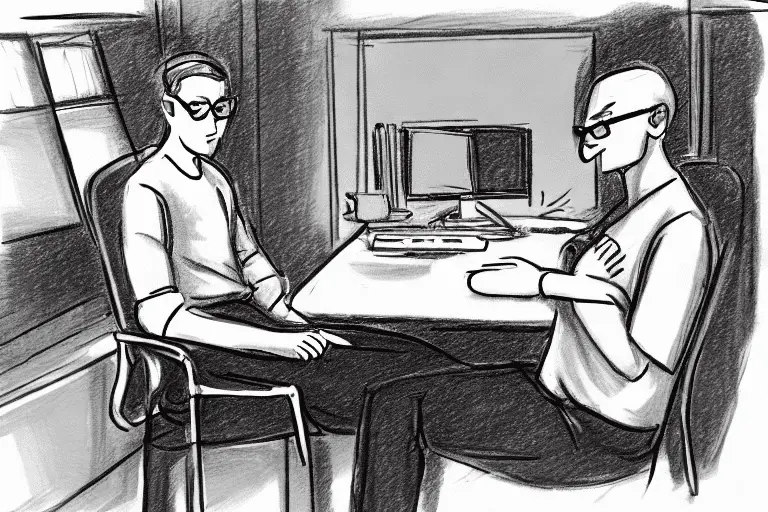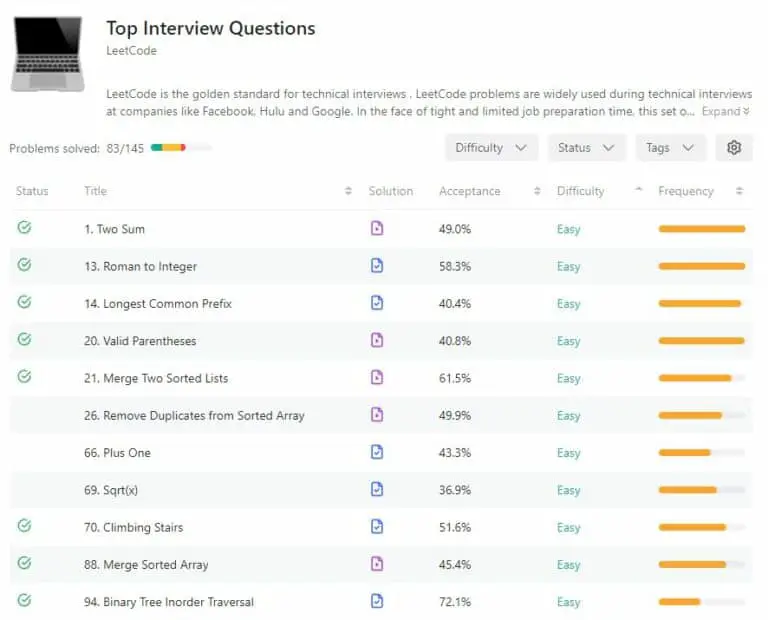What To Expect In An Exit Interview: Definition, Questions, And Tips
An exit interview is a type of interview that is given to an employee who is leaving a company. It’s a type of interview that isn’t evaluated on a pass-or-fail basis, instead being used solely for gathering information. This is why it’s also known as an exit interview survey. They’re used to gather information about an employee’s experience at a company to help the company improve its business for its existing and future employees.

Exit interviews are especially important for big tech companies who hire software engineers because of the low supply of highly skilled software engineers. Companies use the findings of these interviews to make them competitive employers against other companies competing with the same talent pool of software engineers trying to get hired.
In this article, we’ll discuss what an exit interview is in more detail along with the purpose of an exit interview and whether you’re required to do an exit interview. Subsequently, we’ll discuss the types of questions that are asked during an exit interview so you can prepare for what you’re going to be asked and know what to expect.
Then, we’ll talk about what you should say and talk about during an exit interview and what you should avoid. We’ll even discuss whether you should be honest during the interview.
At the end of the article, we’ll discuss how exit interviews can affect the interviews you do in the future and how you can use your preparation for exit interviews toward preparation for other interviews like behavior interviews.
What Is An Exit Interview?
An exit interview (also known as an exit interview survey) is a type of interview that is given to an employee as they’re leaving (otherwise known as “quitting”) a company, typically at their own will. This interview is different from phone, panel, and group interviews because it’s for current employees, not for new job applicants.
In an exit interview, an employee is interviewed by an interviewer (in a one-on-one interview) who is usually a human resources (HR) representative, and the interviewer asks the employee about their experience with their tasks, team, manager, and company and offers them an opportunity to voice their opinions and concerns.
The exit interview is a type of interview that needs the least amount of time to prepare for and is less formal than other types of interviews.
What Is The Purpose Of An Exit Interview?
The purpose of an exit interview is to allow a company to understand why employees are leaving their businesses. The feedback that is collected from exit interviews is used to drive business changes within a company to help prevent regrettable attritions in their workforce. Regrettable attrition is when a company regrets losing a productive employee who chooses to voluntarily leave the company, against what the company would like.
Do You Have To Do An Exit Interview When Leaving A Company?
No. You do not have to do an exit interview when leaving a company because they’re voluntary. After all, you’re leaving a company anyway if they want to do an exit interview with you. However, if you want to leave amicably so that you can potentially work at the company on a later day, then you’ll want to do the exit interview.
What Types Of Questions Are Asked In An Exit Interview?
The types of questions that are asked in an exit interview relate to work-related topics such as your role, responsibilities, work environment, career opportunities, management, team, and reasons for leaving. 5 examples of questions that would be asked in an exit interview are listed below.
- “Did you feel that your job description accurately represented the responsibilities and tasks you were assigned during your tenure? Were there any aspects of your role that were unclear or not as you expected?”
- “How would you describe the company culture and the working environment during your time here? Were there any particular incidents or ongoing issues that negatively impacted your experience?”
- “Did you feel that you received adequate training and support to perform your job effectively? Were there opportunities for professional growth, and were they easily accessible to you?”
- “How would you rate the quality of management and supervision in your department? Can you provide any feedback or suggestions for improvements in leadership or communication?”
- “What were the primary reasons for your decision to leave the company? Are there any changes or enhancements you’d suggest that might improve the employee experience or reduce turnover?”
What Should You Say In An Exit Interview?
You should say any objective information that could potentially benefit your employer during an exit interview. 7 examples of the topics you should prepare to talk about during an exit interview are listed below.
- Professional Growth Experienced: Discussing personal growth in an exit interview identifies the strengths of the company’s development programs. It pinpoints areas that effectively foster employee growth.
- Challenges Faced: Discussing overall challenges during the exit interview provides the company with a holistic view of potential obstacles faced by employees. This feedback is vital for understanding and rectifying broader issues within the organization.
- Experience With Your Team’s Dynamic: Providing insights on team interactions in the exit interview allows the company to better understand its team culture. It can address any dysfunctions and celebrate strengths.
- Feedback On Your Workload: Addressing workload in the exit interview helps gauge workload distribution and balance. It informs management if tasks are overburdening or if resource allocation needs adjustment.
- Effectiveness Of Training Programs: Giving feedback on training efficacy in the exit interview lets the company refine its programs. It ensures resources are well-spent on training that truly benefits employees.
- Opinions On Tools And Technologies: Sharing opinions on tools during the exit interview assesses if the current technology supports employee productivity. It guides future tech investments to better align with employee needs.
- Feedback On Company Culture And Values: Discussing culture and values during the exit interview ensures the company maintains a positive and inclusive environment. It identifies potential misalignments that could affect employee satisfaction and retention.
What Should You Not Say In An Exit Interview?
There are no topics that you shouldn’t talk about during an exit interview. Every topic that’s related to your experience working at the company is relevant and a fair topic to talk about during the interview. However, there are certain ways you should phrase any criticism you have about the company.
Examples of detrimental statements you should not say according to their topics are listed below. Along with the statements are reasons why you shouldn’t say them and how you should change the wording to make the statements more constructive.
- Topic: Salary & Benefits
- Don’t say: “Your pay is a joke.”
- Why: In an exit interview, it’s important to address salary concerns professionally; being derogatory doesn’t provide constructive feedback for improvement.
- Topic: Management Style
- Don’t say: “The bosses here are clueless.”
- Why: During an exit interview, feedback about management should be precise. Broad negative comments lack specificity and miss an opportunity for growth.
- Topic: Work-Life Balance
- Don’t say: “I had no life working here.”
- Why: Exit interviews are more productive when specific issues like workload or hours are addressed rather than making sweeping negative statements.
- Topic: Training & Onboarding Process
- Don’t say: “Your training was a waste of time.”
- Why: In the context of an exit interview, it’s more beneficial to specify which parts of the training were less useful and why, so the company can refine its approach.
- Topic: Company Reputation & Image
- Don’t say: “Everyone knows this company is going downhill.”
- Why: During an exit interview, it’s better to avoid general negative statements. Constructively communicating valid concerns helps the company address potential issues.
- Topic: Facilities & Resources
- Don’t say: “Your equipment is ancient and worthless.”
- Why: An exit interview aims to gather actionable feedback. It’s more helpful to specifically address which equipment needs updating and why.
- Topic: Job Role & Responsibilities
- Don’t say: “My job was pointless.”
- Why: Exit interviews provide an opportunity to discuss role clarity or how job responsibilities could be more meaningful rather than resorting to vague criticism.
- Topic: Feedback & Recognition
- Don’t say: “No one ever acknowledges good work here.”
- Why: In an exit interview, it’s more beneficial to discuss how recognition could be improved or instances where feedback was lacking to inform company practices.
Should You Be Honest During An Exit Interview?
Yes, you should be honest during an exit interview. There’s no reason to lie to a company once you’re in the exit interview stage of leaving or quitting a job. Being honest will help the company improve as a business and be a better organization if you come back to work for them at a later day.
How Can Exit Interviews Affect Your Future Interviews?
Exit interviews can affect your future interviews at other companies in a positive way by providing you with a formal time to recollect all the experiences you’ve had while working at a company. Using these experiences you can cultivate a set of experiences that you’ll want to discuss in future interviews like behavioral interviews, group interviews, and panel interviews.
How Can You Start Preparing For Future Interviews?
You can start preparing for future interviews after an exit interview by understanding what you liked and didn’t like about the company you were working for. Additionally, with the memories from your work experience, you can cultivate stories that are used in interviews like a behavioral interview.
Many people struggle with preparing for behavioral interviews because they have issues with recollecting past experiences that are relevant, but having an exit interview provides you with the opportunity to collect the thoughts there and then so you can begin practicing essential behavioral interview questions and passing more behavioral interviews.







